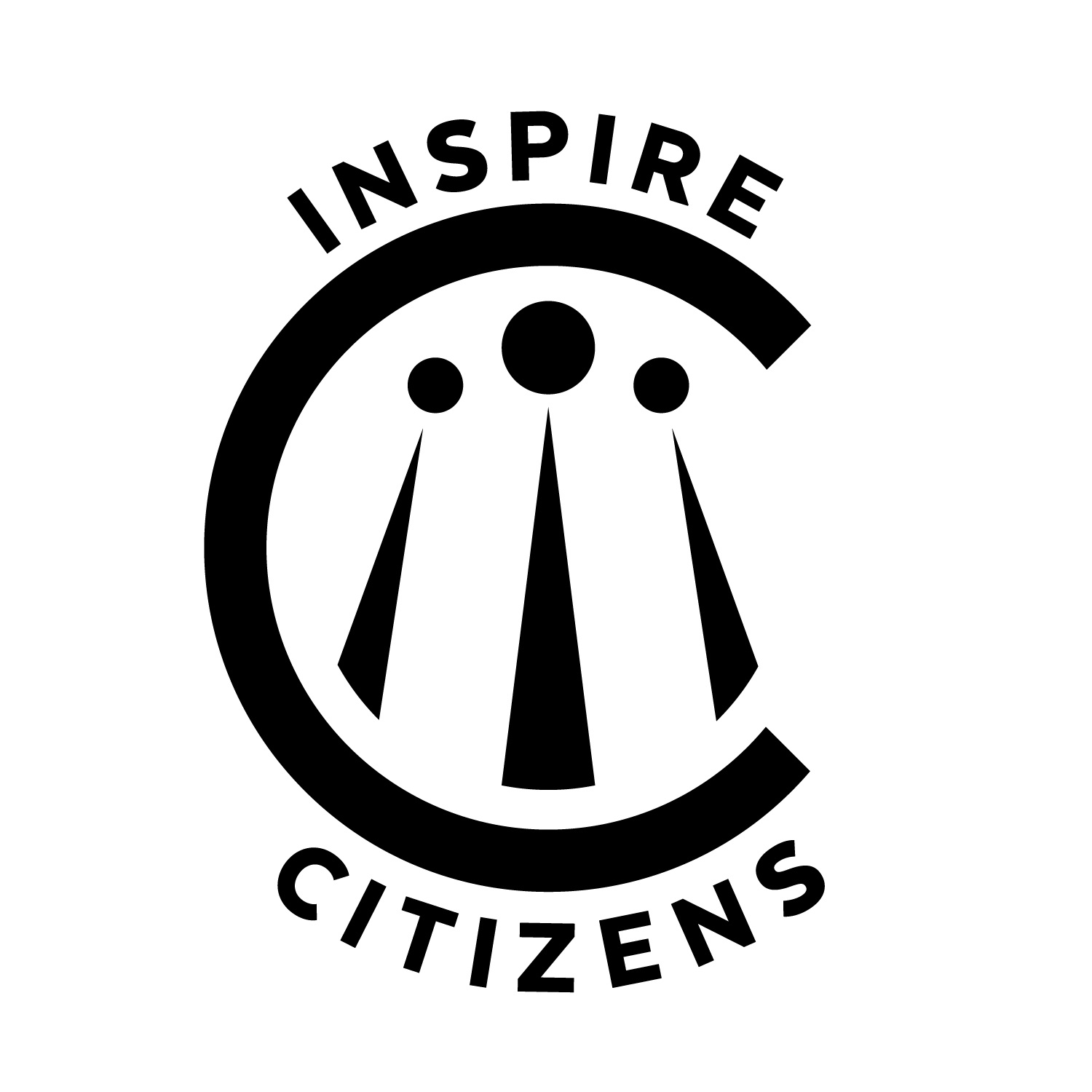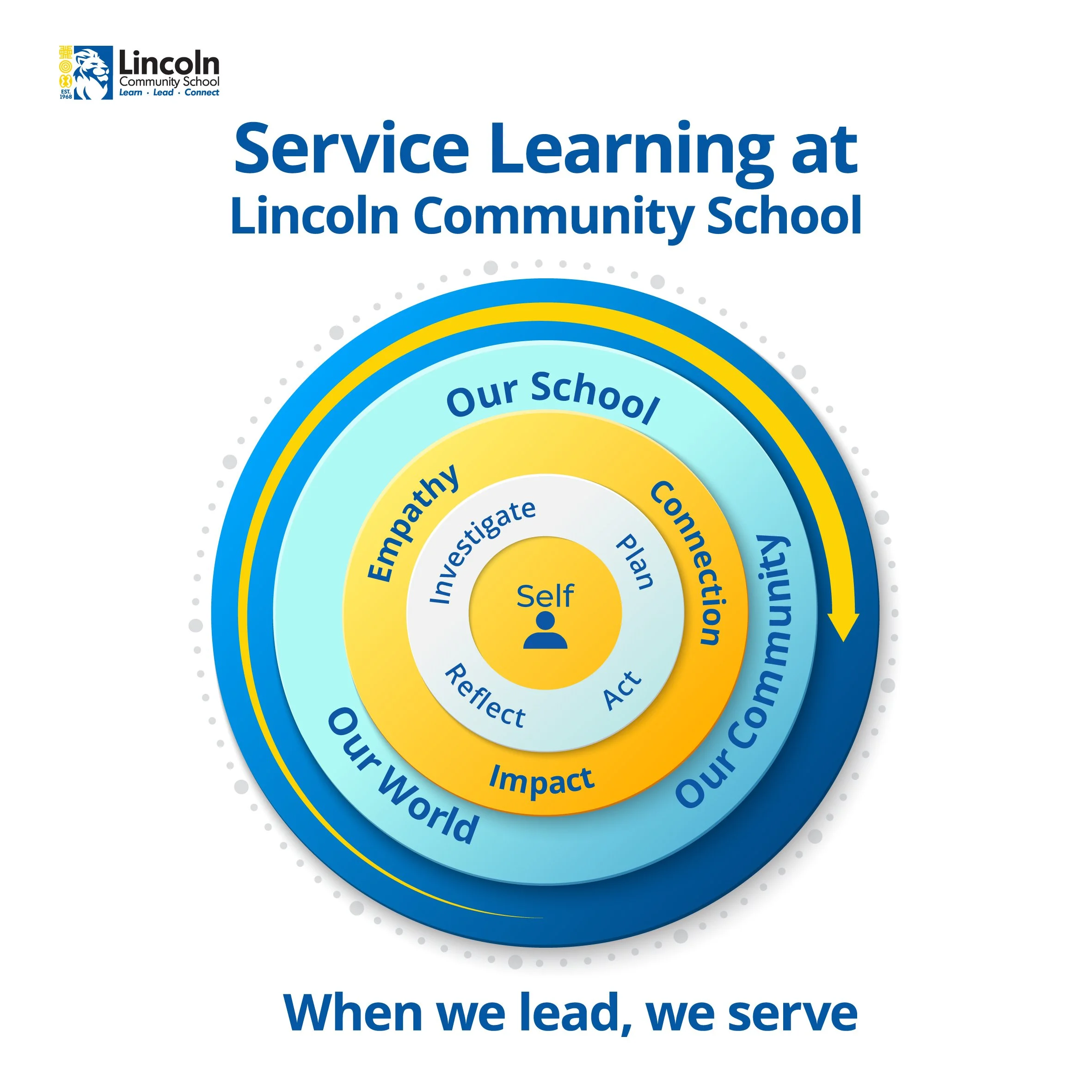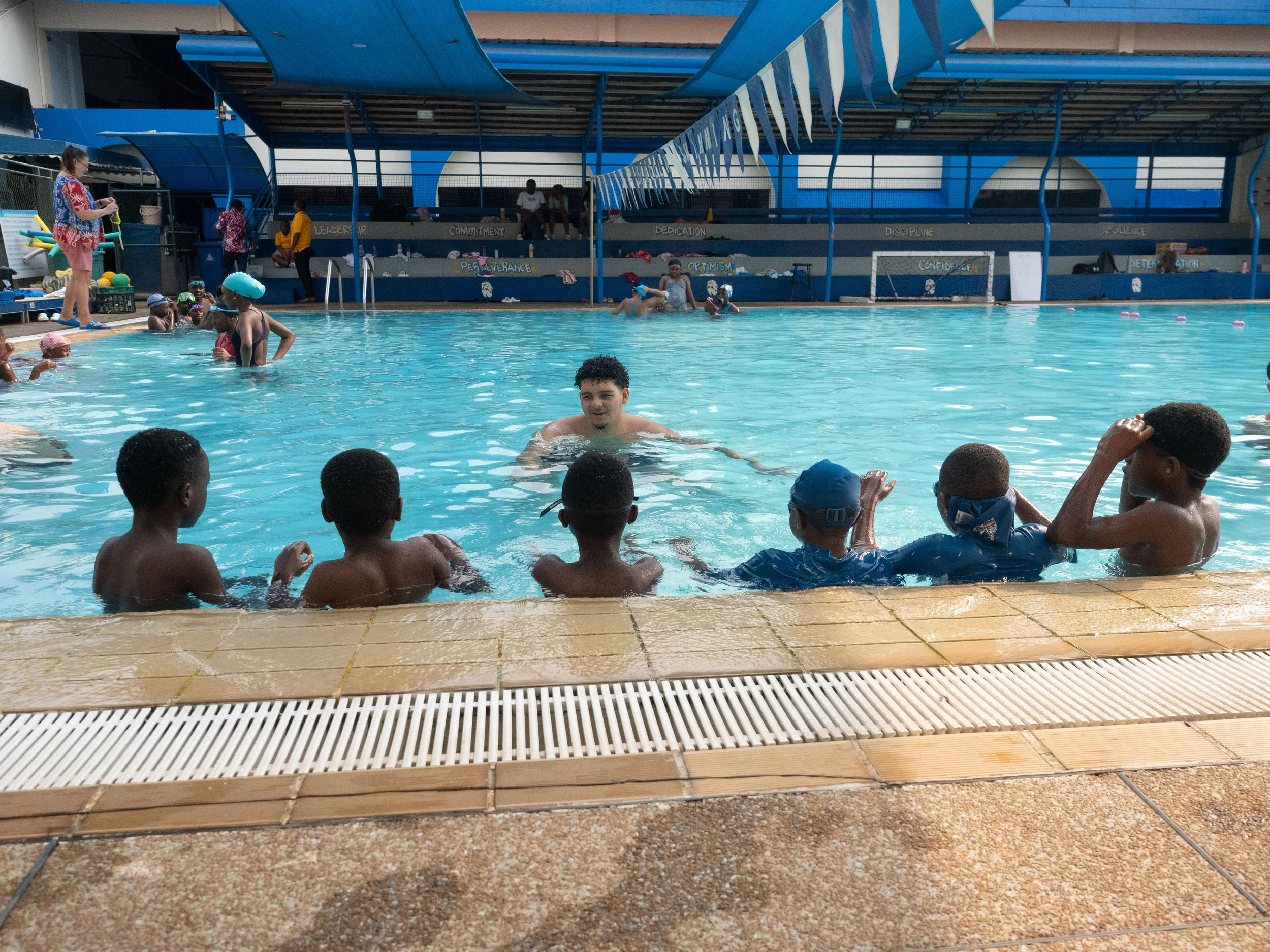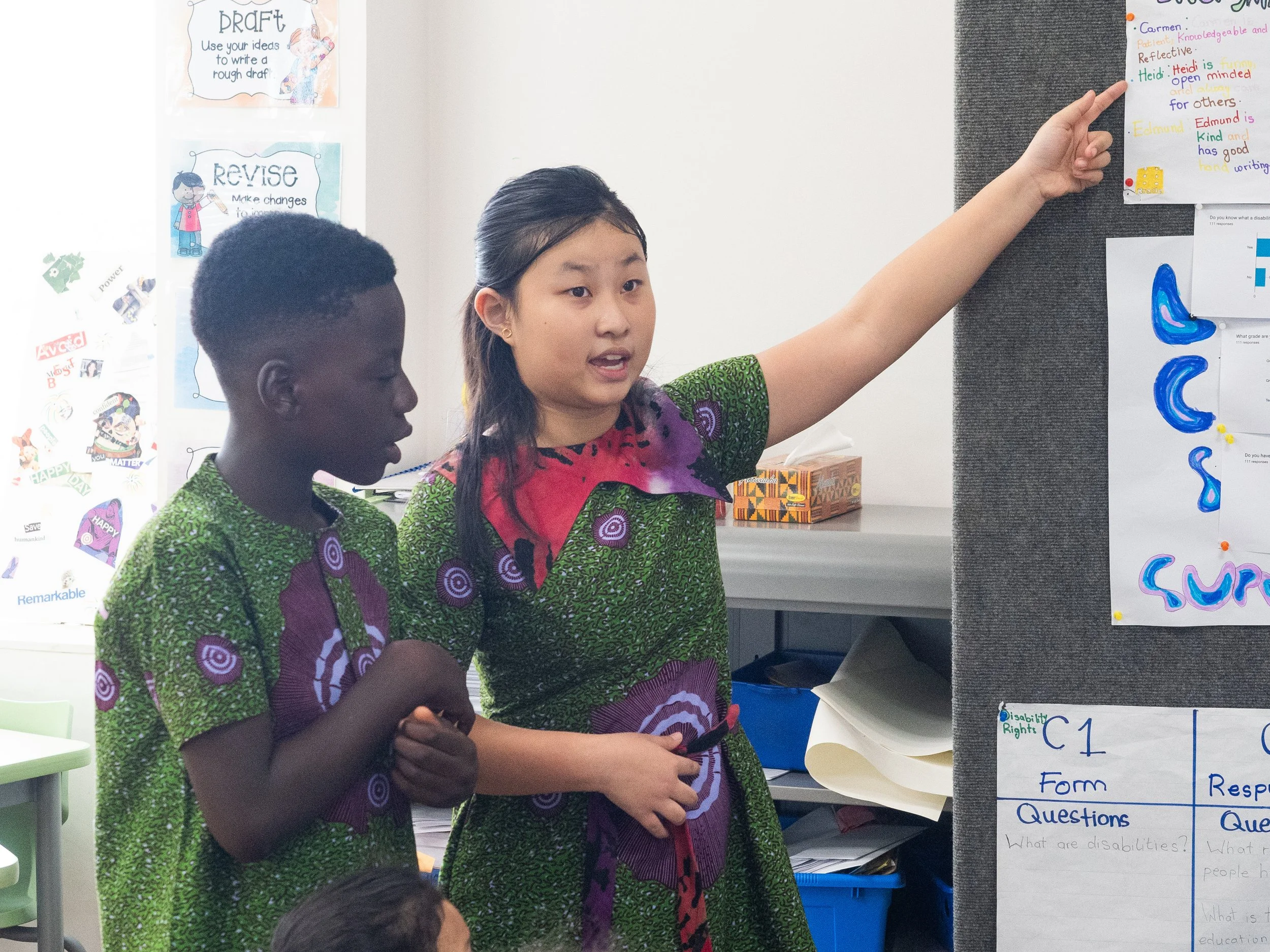Revitalizing Service Learning at Lincoln Community School: A Collaborative Story Unfolds
At Lincoln Community School (LCS) in Accra, Ghana, service learning is undergoing a powerful transformation. With a renewed commitment to meaningful, age-appropriate, and community-centered action, LCS is redefining what service looks like across all grade levels. Supported by Inspire Citizens and guided by a dedicated leadership team, this initiative is more than just a curriculum enhancement—it is a shift in mindset, ensuring that service is not simply an act of giving, but a way of learning, connecting, and growing together.
Seizing an Opportunity to Create a School-Wide Vision for Service
Since partnering with Inspire Citizens in 2022, LCS has been systematically rolling out a new service learning framework, carefully integrating it into curriculum units, extracurricular programs, and school-wide initiatives.
The vision for service learning at Lincoln Community School creates opportunities for more meaningful engagement by learners throughout their learning journey. (image supplied)
"Scott Jamieson has been working with us for over a year and a half now," explains Alexis Smith, LCS’s Student Support and Service Learning Coordinator. As Inspire Citizens’ Global Collaboration Lead, Scott is able to facilitate the development of Lincoln’s vision at the leadership level as well as with teachers who are implementing units of study in their classrooms. "We started with leadership planning—mapping out our vision, rollout strategy, and how service learning would be woven into different areas: unit planning, Service as Action (MYP), CAS (DP), and clubs and extracurriculars,” adds Alexis. “We needed a model that was sustainable, meaningful, and that met students where they are."
The result is a robust, adaptable framework that encourages students to engage in service with their communities rather than simply doing service for others. This shift, emphasized across divisions, moves students away from transactional acts like fundraising and toward deeper learning experiences that foster empathy, connection, and reflection.
How to Build Foundations for Service in the Primary Years
Unlike MYP and DP, where service learning is a formal IB requirement, the PYP does not have built-in service learning mandates. However, this has not stopped LCS from embedding service meaningfully into early education.
"The way service comes alive in the PYP is through the five types of action," explains Natalie Kramer, PYP Coordinator and Deputy Elementary School Principal. "We wanted to ensure there was a clear and seamless transition to MYP while making service learning a natural, developmentally appropriate part of students' experiences."
Service mindset in action: Middle schools students seized upon a spontaneous opportunity to assist younger swimmers. (image supplied)
One example of this shift is the Grade 5 PYP Exhibition, where students undertake long-term inquiry projects that integrate service. "It's amazing to see students move away from the idea that service has to be a huge project—raising money or organizing a canned food drive—and instead focus on actions that matter in their daily lives," Natalie adds.
A powerful instance of a spontaneous service mindset emerged during an elementary sports day, when middle school students, without prior planning or prompting, jumped into the pool to assist younger swimmers. "That was totally organic and just happened," says Natalie.
Tapping Into the Middle Years Capacity for Deeper Reflection and Action
For MYP students, service learning is becoming more intentional and connected to curriculum objectives. Amber Rhinehart, MYP Coordinator for Lincoln Community School, reflects on the shift:
"Having guidance from Inspire Citizens helped us to ask: What does meaningful service actually look like at LCS? How do we differentiate between volunteerism and genuine service learning? And all of this work must be bound within our strategic plan.”
One exemplary unit sees Grade 9 and 10 students teaching swim safety to fourth graders from a neighboring school, a critical initiative in a country where many do not have access to swimming lessons despite living near the ocean.
"They’re not just learning about safety in their own PE class," Alexis explains. "One of the reasons why we created our unit is our context. We already have kids learning about pool safety and we have a school right next door with so many students that we could support and build a connection with.” Alexis adds, “Because they're so close, it's not a one-off event–we can do it multiple times in order to build up those skills and actually have a bigger impact.”
Another project involved Grade 6 students designing wearable toys for younger peers using principles of design thinking. They conducted interviews, created prototypes, and iterated on their designs based on real feedback, making the service experience hands-on and collaborative.
Empowering Independent Action in the Diploma Programme Years
For DP students, service takes on a leadership role through Creativity, Activity, and Service (CAS). The emphasis is not on fulfilling a checklist of activities, but on deeply considering ethical impact, sustainability, and personal growth.
"Our students engage with complex issues—child labor, justice, environmental challenges—but we don’t want to paralyze them with problems that feel too big," says Amber. "So we connect them with local organizations actively working on solutions. It’s about seeing that adults are taking action and that they, too, can contribute in meaningful ways."
A key figure in supporting DP students on this journey is Ann Manu, the CAS and Service as Action coordinator, who works closely with students to ensure their projects are purposeful.
"She takes a lot of the student questions about what counts, what doesn't count, and helps guide them through this shift in thinking," explains Alexis. "She’s meeting with them every month, making sure they’re reflecting on what they’re doing—not just logging hours, but truly considering their impact."
This emphasis on reflection and balance is crucial, given the academic pressures of the DP program.
"As an IB school, there's a lot of rigor and other commitments these students have," Alexis continues. "So we’re also wrestling with how to support them—how to ensure that service isn’t just another task, but something meaningful and integrated into their learning."
By embedding service into CAS in a thoughtful, well-supported way, LCS ensures that students graduate not just with a record of activities, but with a deep understanding of their role in communities and the world.
The Role of Inspire Citizens: A Guiding Partnership
The deep empathy work that is foundational to the PYP Exhibition resonates throughout the planned educational experience of students at LCS because of an intentional school-wide vision. (image supplied)
The assembled members of the leadership team are particularly appreciative of the support they receive from Inspire Citizens. They agree that the continued facilitation efforts of Scott and Aaron have been instrumental in guiding LCS through this transformation.
"Scott has provided us with frameworks and conversations,” explains Amber. “And now we have our guiding documents that help us to define ‘What is service at LCS?’"
Alexis agrees, emphasizing the importance of having expert guidance in areas of conceptual development but also in very practical ways, such as the creation of a graphic that plays an important role in communicating the school’s approach to service.
Looking Ahead: A Sustainable and Evolving Vision
While LCS has made significant strides in redefining service learning, the journey is ongoing. The leadership team remains committed to refining their approach, strengthening local partnerships, and ensuring that service is a meaningful, reflective process for all students.
With a strong foundation, a passionate leadership team, and the continued support of Inspire Citizens, LCS is well on its way to making service learning not just something students do—but a way they see the world.



